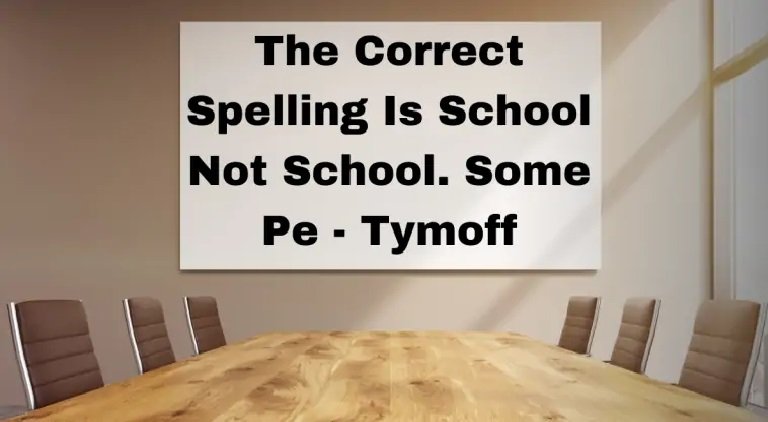The correct spelling is school not school. some pe – tymoff is a phrase that confuses many people at first glance. However, once you look deeper, it becomes clear that this viral quote is about spelling, learning, and the way language influences our daily lives. The phrase, often shared online, mixes humor with an important reminder: spelling matters, and attention to detail in words is a skill that carries weight everywhere.
What Is the Meaning of the Correct Spelling Is School Not School. Some Pe – Tymoff?
The correct spelling is school not school. some pe – tymoff might look like a repetition of the same word, but it is a playful reminder about spelling accuracy. It suggests that while people may think spelling mistakes are minor, they can change meaning, lower credibility, or show carelessness. Tymoff, often used as a name linked to viral phrases, adds an element of curiosity and makes the line more memorable.
Why Spelling Matters in Education
The correct spelling is school not school. some pe – Tymoff highlights that spelling is one of the first lessons taught in school. Spelling creates the foundation for reading, writing, and effective communication. When students learn how to spell correctly, they also build confidence in expressing their thoughts clearly. A strong base in spelling helps in exams, careers, and daily interactions.
The Humor Behind the Phrase
The correct spelling is school not school. some pe – tymoff became popular because it is humorous. At first, readers see the same word repeated, which feels ironic. Humor makes the lesson stick. People tend to remember funny or unusual phrases far longer than plain instructions. That is why this quote became viral on social media.
Who Is Tymoff?
The correct spelling is school not school. some pe – tymoff includes the name Tymoff, which has become tied to inspirational or witty internet quotes. Even though the exact identity is unclear, Tymoff has turned into a digital signature that people recognize as part of life lessons or motivational phrases. In this case, it attaches importance and curiosity to what seems like a small spelling lesson.
How Students Relate to the Phrase

The correct spelling is school not school. some pe – tymoffs connects with every student. Almost everyone has been corrected by a teacher for a spelling mistake. This phrase mirrors the style of classroom reminders where teachers stress accuracy by repeating a word or pointing out errors. Students may laugh at it, but they also remember it later during writing tasks.
Social Media and Viral Language Trends
The correct spelling is school not school. some pe – tymoffs is part of a bigger trend where unusual phrases spread quickly online. Social media loves irony, confusion, and humor. People share phrases that look strange because they spark curiosity. This makes learning fun and modern, especially for younger audiences who spend more time online than in traditional classrooms.
Lessons About Accuracy in Life
The correct spelling is school not school. some pe – tymoffs is not just about spelling. It is a reminder that accuracy in small details shows discipline and care. Just like spelling the word “school” correctly matters, paying attention to details in jobs, projects, or relationships also matters. The quote teaches that little mistakes can grow into bigger issues if ignored.
Why Do People Misspell “School”?
The correct spelling is school not school. some pe – tymoffs highlights one of the most commonly misspelled words. Many learners write “skool” because it matches how the word sounds. Phonetic spelling often tricks students. Additionally, typing errors on digital devices add to the problem. While autocorrect helps, depending on it too much weakens memory skills.
Spelling and Professional Growth
The correct spelling is school not school. some pe – tymoffs also applies in professional life. Spelling mistakes in resumes, emails, or reports can hurt credibility. Employers value attention to detail, and repeated errors may cost opportunities. Thus, correct spelling is not just a classroom skill but also a career-building tool.
Technology’s Role in Spelling
The correct spelling is school not school. some pe – tymoffs ties into how technology supports spelling today. Tools like Grammarly, spell-check in Word, or auto-correct on phones are useful. However, students and professionals should not rely on them completely. Building personal spelling skills ensures better independence and confidence when technology is unavailable.
Why This Phrase Is Memorable
The correct spelling is school not school. some pe – tymoffs is memorable because it plays with language in a paradoxical way. Repeating “school” makes readers pause and think. The odd structure forces people to reflect on spelling even when they are not studying. That unusual quality is what gives the phrase lasting power.
The Link Between Spelling and Confidence

The correct spelling is school not school. some pe – tymoffs also shows how spelling builds self-esteem. Children who master spelling feel proud when writing essays or exams. Adults who write without errors feel confident in professional settings. Confidence comes from competence, and competence often begins with small skills like spelling.
Examples of Commonly Misspelled Words
The correct spelling is school not school. some pe – tymoffs is one example, but many other words are frequently misspelled. Words like “definitely,” “accommodation,” and “separate” confuse even adults. Lists of the most misspelled words appear in dictionaries and school materials. Learning them helps improve daily writing.
Tips to Improve Spelling
The correct spelling is school not school. some pe – tymoff can motivate learners to practice spelling daily. Here are useful tips:
- Read books, articles, and newspapers to see words in context.
- Keep a small journal and review spelling mistakes.
- Use flashcards to practice tricky words.
- Learn prefixes, suffixes, and roots to understand word structure.
These strategies make spelling improvement simple and enjoyable.
Humor in Education
The correct spelling is school not school. some pe – tymoff proves humor is powerful in education. When teachers present lessons with fun, students remember better. A funny phrase or an ironic correction may stay in the mind far longer than ordinary explanations. Humor reduces stress and builds interest in learning.
Spelling in the Digital Age
The correct spelling is school not school. some pe – tymoff reminds us that despite abbreviations, emojis, and shortcuts online, spelling remains critical. Correct spelling ensures clarity, avoids miscommunication, and shows respect for the reader. In schools, exams, and professional spaces, it cannot be replaced by casual text language.
Misconceptions About Spelling
The correct spelling is school not school. some pe – tymoff breaks several myths. Many believe spelling is unimportant because technology fixes it. Others think spelling errors are harmless. In reality, poor spelling affects academic success, job opportunities, and even social reputation. Mastering spelling is a life skill, not just a school requirement.
Conclusion
The correct spelling is school not school. some pe – tymoff may look odd at first, but it carries a timeless lesson. It reminds us that spelling accuracy is important in education, career, and daily communication. Its viral humor makes the message easy to remember, proving that sometimes the simplest words carry the deepest lessons.
Read more: The Hidden Psychology Behind Why Debt Consolidation Fails (And How to Beat the Odds)
FAQs About The Correct Spelling Is School Not School. Some Pe – Tymoff
It is a humorous phrase that highlights the importance of spelling accuracy and has gone viral online.
It became popular because of its irony and humor, making people laugh while teaching a serious lesson.
Tymoff is a name often linked to viral quotes and witty statements, though the exact origin remains unclear.
It relates to education because it emphasizes the value of correct spelling in learning and communication.
No, it also teaches a broader lesson about accuracy, attention to detail, and the importance of clear communication.


